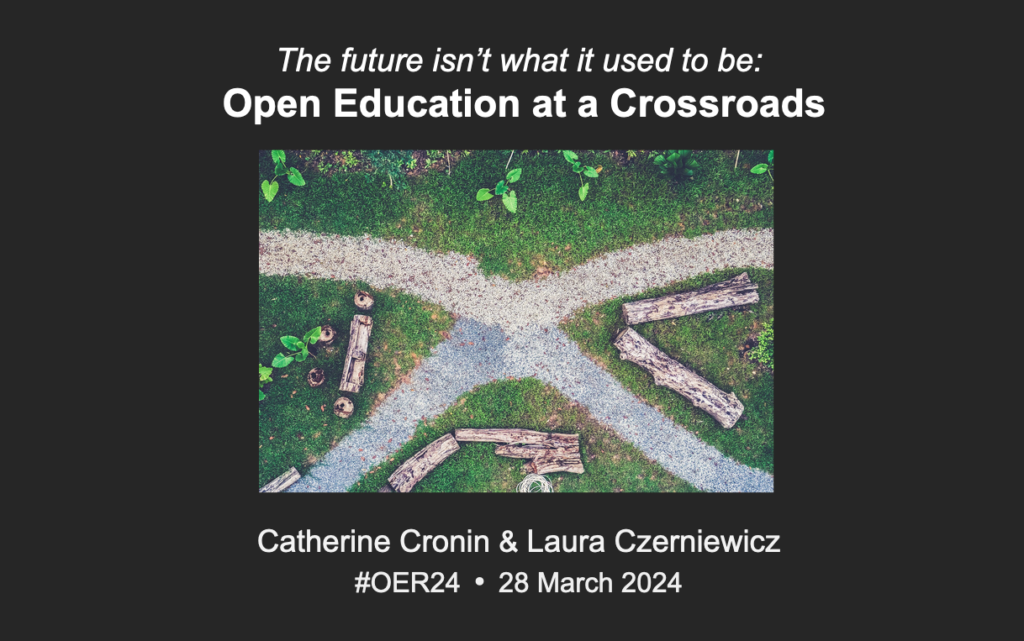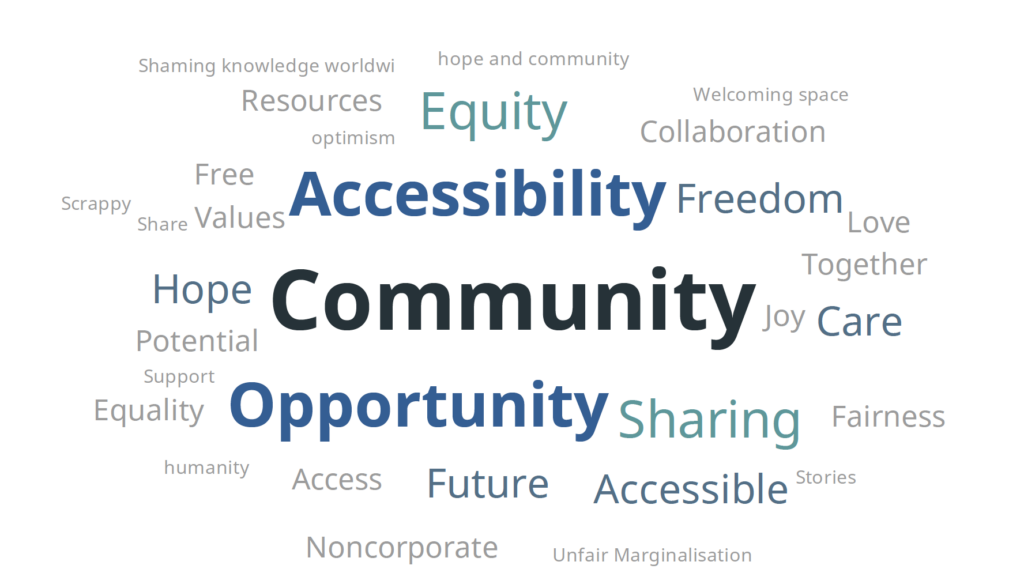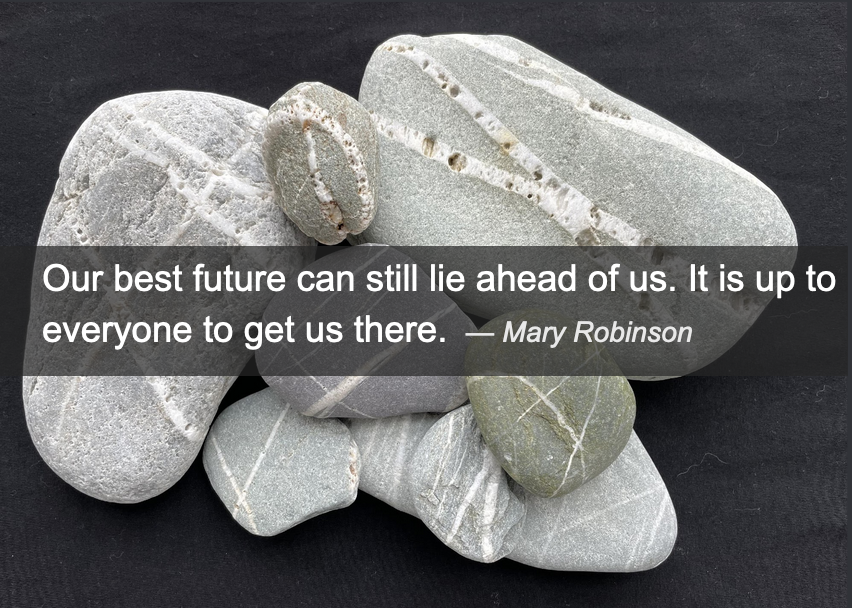
At the recent OER24 conference in Cork, Ireland, Laura Czerniewicz and I had the great honour of giving a joint keynote, in the company of another keynoter, the inimitable Rajiv Jhangiani. In addition, we were inspired by the range and depth of work shared by so many in the international open education community who presented at and participated in the conference.
We have many thoughts and reflections mulling away. For now, we are sharing resources from our keynote, The Future isn’t what it used to be: Open Education at a Crossroads.
Slides: We presented the keynote using a slide deck with few words, informative images, and some wonderful abstract and alternative visuals (we are not boasting, thanks go to the excellent artists). The slides are at https://bit.ly/oer24-crossroads.
Keynote essay: We also wrote up the keynote as an essay. It is not quite a transcript as it is halfway between talking and writing, including all of the references we used. You can find it here.
Video recording: Thanks to the conference organisers, ALT and Munster Technological University, the keynotes were also recorded. Ours can be accessed here (our talk starts at 23:30).
Resource list: During our talk, we linked to a list of critical tech organisations and initiatives which we have been keeping. We thought this might be useful to others, so have created a shared and editable spreadsheet of critical tech organisations and initiatives here, which everyone is invited to use and/or add to.
Participant responses: Finally, during our keynote, we asked everyone in the room two questions.
Q1: What do you think of when you hear “open education”?
Near the start of our keynote, we asked: “What do you think of when you hear “open education?”. The responses from participants are here, in the form of a word cloud –largely positive and hopeful words, with some indicating a critical approach.

Q2: What could we do right now?
The second question we posed, right at the end of our talk, was: “What could we, as this community – this conference group – do right now?”. With just a few minutes to collect responses, it was encouraging to receive over 90 immediate suggestions. We have clustered these suggestions into the following eight themes, for ease of sharing:
- Take action, make plans
- Communicate and share
- Work together, especially across silos
- Expand the open education community
- Develop/influence strategy and policy
- Be open; advocate for open
- Challenge existing power structures; work towards justice
- How we work is as important as what we do
Following are the specific suggestions from OER24 participants, clustered by theme:
- Take action, make plans
- Value the small initiatives
- Start small, keep the faith
- Small tactical actions, when safe to do so, linked to desired utopian futures
- Create agile opportunities for small tangible projects
- Hackathon; OER Hackathon
- Online sprints around a topic
- Concrete result in cooperative project or policy by OER 2026
- Communicate and share
- Communicate
- Share; Share the knowledge
- Spread the word (x2); Keep talking
- Spread the word in our own institutions and build the momentum
- Blog!
- Cascade key messages
- Talk to our colleagues about these topics when we go back to our workplaces
- Continue the conversations after this
- Share practice, success and failures, too
- Keep engaging in multi level discussion on OEGlobal Connect
- More discussion not repeat the same questions
- Bring these questions to our students
- Create space for conversations
- Identify the challenges explicitly – great start today. Keep talking.
- Work together, especially across silos
- Come together
- Link
- Stop competing
- Connect and collaborate; Collaborate
- Continue to collaborate, listen to those not represented
- Seek collaborative partnerships and relations
- Collaborate more across related communities with similar goals
- Collaborate with the wider open ecosystem
- Collaborate at the crossroads
- Be more proactive in research and collaboration
- Work together and start now
- We can’t do it alone
- Coordinate our efforts more intentionally to avoid duplication
- Collaborate on sharing thoughts on embedding strategic, systematic priorities within HEIs
- Discuss the challenges in the communities, work on shared value system
- Expand the open education community – across sectors, generations, differences
- Bring new blood into the community
- Invite practitioners to next conference
- Help two-year college folks get to these [conferences]
- Reimagine all forms of teacher education
- Continue discussing openly with different minded people
- Talk to others beyond our community
- Talk as much as possible to people outside of this community, those with whom we may well clash (at first) because we cannot only talk to each other
- Develop/influence strategy and policy
- Bring the white paper to our institutional leadership
- Share the OER24 keynotes with the most senior person we can access
- Get academic development/T&L teams to commit to OE
- Write business cases for OE (x3)
- Translate open as a base of other strategic themes
- Write to a politician
- Influence strategy and policy
- It’s all about the policy
- Make better policies and share these
- Influence policy, make open an integral part of what HE does
- Be open; advocate for open
- Demystify OE
- Reuse other people’s work and give attribution
- Keep modelling open practice
- Apply inclusive and open practices in our daily work
- Practice what we preach!
- Leverage resources
- Keep banging the OE drum
- Educate others in OE
- Advocate for open. Rebel against data and currency thieves.
- Challenge existing power structures; work towards justice
- Collectively develop OER for capacity building – awareness raise in ethics, responsibility and justice in digital Ed
- Advocate for debt relief for institutions of higher education
- Prioritize transgender inclusion
- Defend the public good
- How we work is as important as what we do
- Return to our institutions renewed in a faith in the possibility of change
- SHOW UP FOR EACH OTHER
- Learn from each other
- Encourage each other
- Support each other; Support each other to make change
- Be kind
- Insist and be kind
- Operate inclusively
- Include others
- Listen to the quieter voices
- Lift up new ideas and out of the box thinking
- Do not take the easy route
- Commit
- Be invested
- Keep hopeful. Hope is an act of resistance.
Additional, uncategorised comments
- Dance at the crossroads
- Thank Laura and Catherine for their wonderful keynote and leadership
- Read HE4Good book
- Tom Farrelly
- Pannenkoeken bakken
Finally, to wrap up this post, we note that we will continue to explore the issues, tensions and opportunities we highlighted in the keynote – as well as the range of ideas shared by participants during our keynote (summarised above) and throughout the OER24 conference. We would like to continue to work in collaboration and coalition with many across the open education community, and will share, write and blog in the process. With many of you, we look forward to building better futures for all.

(This blog post is cross-posted on Laura Czerniewicz’s blog also.)